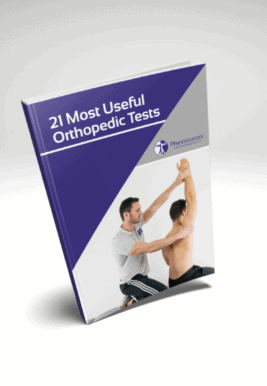Learn
Full Can Test | Subacromial Pain Syndrome Assessment | Rotator Cuff Pain
The Full Can Test has a sensitivity of 70% and a specificity of 81% to detect tears of the supraspinatus according to a study by Jain et al. (2017). Therefore, it is moderately useful to in- and excludes supraspinatus tears. But be careful: Boettcher et al. (2009) also examined the EMG activity of 13 muscles in 15 normal subjects and found that the full can test activated 8 other shoulder muscles to the same degree. This means that the Full Can position does not selectively activate the supraspinatus in isolation.
To perform the test ask your patient to bring his arms to 90 degrees of forward flexion in the scapular plane which is also referred to as scaption and then apply downward pressure and ask your patient to hold against it.
This is test is considered positive if your patient complains of pain in the shoulder (often in the deltoid region) or if weakness is detected.
21 OF THE MOST USEFUL ORTHOPAEDIC TESTS IN CLINICAL PRACTICE

Other common tests to assess for subacromial impingement syndrome are:
References
Like what you’re learning?
BUY THE FULL PHYSIOTUTORS ASSESSMENT BOOK
- 600+ Pages e-Book
- Interactive Content (Direct Video Demonstration, PubMed articles)
- Statistical Values for all Special Tests from the latest research
- Available in 🇬🇧 🇩🇪 🇫🇷 🇪🇸 🇮🇹 🇵🇹 🇹🇷
- And much more!








